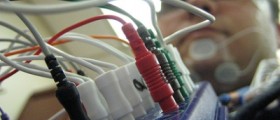
The researchers look at the size of 70 fathers' testicles. They all had children between the ages of one and two. The study team then performed brain scans of the subjects while they were being shown pictures of their kids. Those dads who had smaller testicles showed a greater response in the so-called "reward area" of the brain than guys who had bigger testicles. The study didn't stop with brain scans which actually showed a three categories of testicle sizes and responses. The team also asked the mothers of these fathers' babies about their involvement in parenting. Again, the guys who had smaller testicles were more likely to be active, involved fathers than those with larger ones. Does that mean you should go easy on your partner if he is a lazy dad who happens to have large testicles?
Not quite, Dr James Rilling, one of the researchers says. He told the BBC: "It tells us some men are more naturally inclined to care-giving than others, but I don't think that excuses other men. It just might require more effort for some than others." So, parenting classes for those with larger testicles? Or does practice make perfect and these men just need to get on with it? Well, Rilling has more to say. "We know, for instance, that testosterone levels go down when men become involved fathers," he shares. Isn't that amazing? Of course, a man's father qualities are going to depend on a whole lot more than testicle size. His culture, life experience, and obligations all impact how a man will behave toward his children. Everyone can also change with time, either an improvement or... not. So, what do you ladies think about this study? Do you think you'd be able to distinguish large testicles from smaller ones? How do you think your partner's testicle size relates to his parenting abilities, if at all? We would love to hear your comments!

















Your thoughts on this
Loading...